Balloon ascent, parachute descent
Balloon Ascent, Parachute descent
A turn-of-the century novelty display of daring-do
During the 1890s and into the twentieth century a popular entertainment appears to have been watching a balloon being inflated and then carrying a man (or lady, in the case of Miss Alma Beaumont) aloft. The man (or Alma) then proceeded to launch him/herself from the balloon, and return to earth by means of a primitive parachute.
The advertisement in the Gallery below, from the 8 September 1899 edition of the Western Chronicle, advertises a balloon ascent and parachute descent taking place at the Yeovil gas works and also refers to a failed attempt at Yew Tree Close Park on 8 August 1899. For full details, see the reports at the very bottom of this page,
The series of four balloon photographs below, by Yeovil photographers Witcomb & Son, are of a different event in fields close to Yeovil. This event also appears to be slightly later, say c1902.
gallery
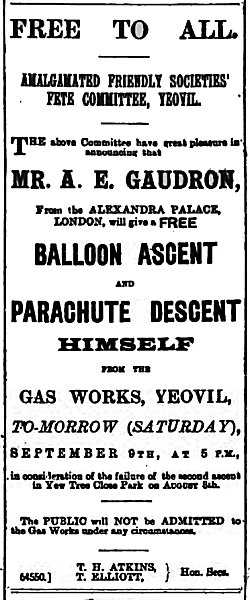
Advertising a 'Balloon Ascent & Parachute Descent' from the 8 September 1899 edition of the Western Chronicle. A temporary main of iron pipe was laid from the Gas Works to the center of a garden joining and abutting Stars Lane, where the balloon was filled with 12,000 sq ft of gas. When the balloon was released, it narrowly missed a factory in the lane and ascended up over Summerhouse Hill. At 2,500 ft, Mr Gaudron parachuted from the balloon - landing next to the cricket field at the rear of Newton Farm. The balloon carried on in the direction of Yeovil Junction, coming down in a field on Clifton Maybank Farm.
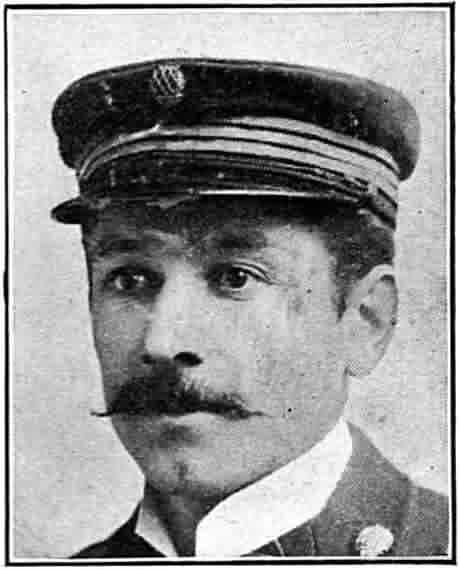
Auguste E Gaudron - the Aeronaut
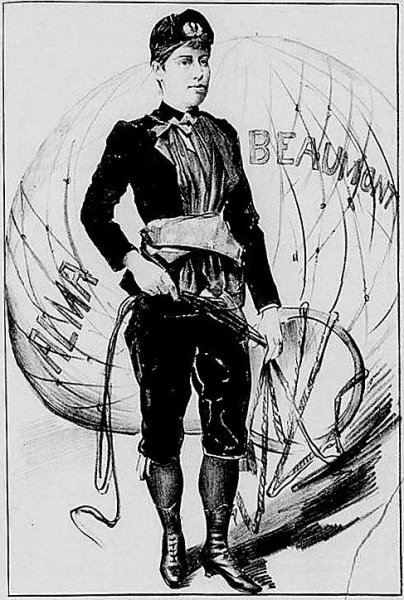
Miss Alma Beaumont - balloonist
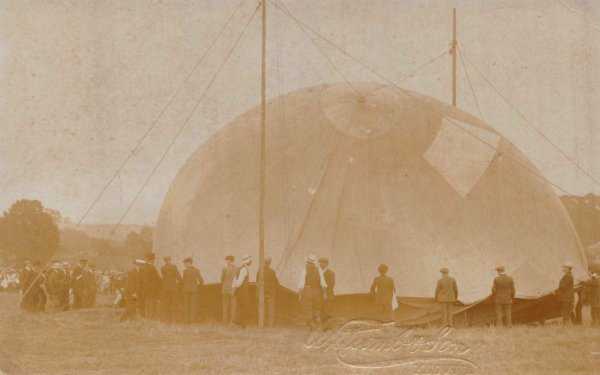
The balloon begins to inflate. Clearly not in the town gasworks, but in a field close to town?
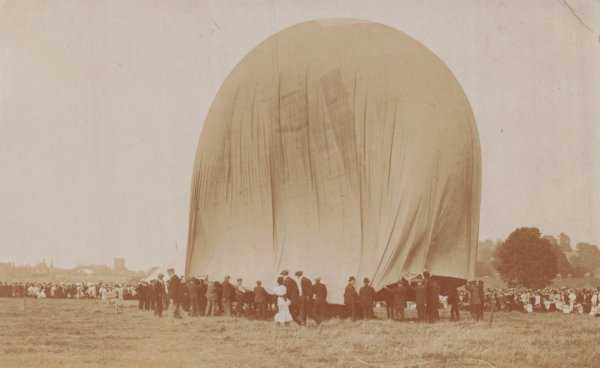
It clearly takes a lot of people to hold down an inflated balloon, while a large crowd looks on.
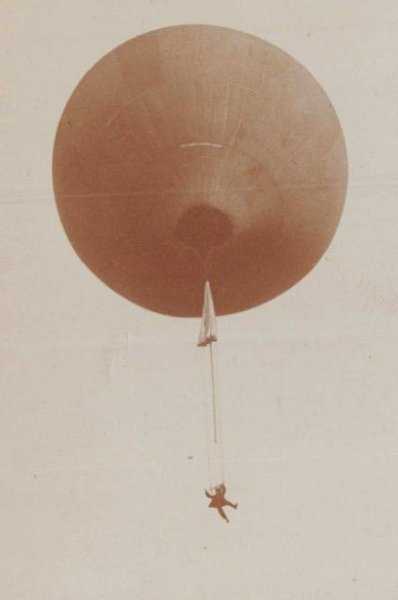
The man jumps from the balloon, his parachute is about to open above him.
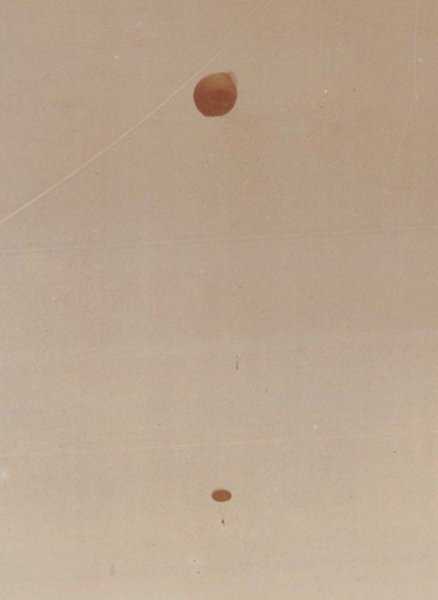
Here, the balloon is at the top of the photo and the daring parachutist is at the bottom.
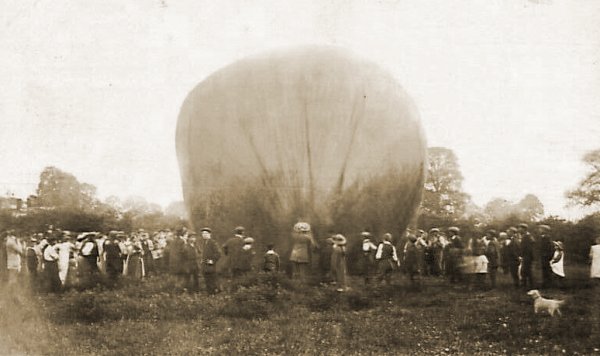
This fifth photograph is most likely from a different event seen in the four previous photos. It is, however, still in Yeovil but possibly as early as 1898.
Newspaper Reports
From the 11 August 1899 edition of the Western Chronicle. (Many thanks to Rob Baker).
DISAPPOINTED
CROWD
The annual fete held under the auspices of the local Societies, took place on Tuesday, and may well be termed the event of the year in Yeovil, and is looked forward to with keen interest by hundreds and thousands of people not only in Yeovil, but in the district round for many miles. The fete, in point of attendance, was the most successful of the festivals held by the societies, an unprecedentedly large crowd of people thronging the town in the morning, and the field in the afternoon and evening.
Some disappointment might at first have been felt when, owing the recent death of Mrs Harbin, of Newton House, the beautiful grounds Newton Park were not available, as has been the case in former years. However, the committee made the best of the matter, and after a good search obtained the permission of Mr Neale, Mrs McCall, and Mr Derryman, to hold the gala in Yew Tree Close Park. The Park itself could hardly have been better for the event, and the beautiful surroundings of the park added much to the enjoyment of the multitude pleasure-seekers, the only drawback to the locality being its comparative long distance from the town.
The committee worked very hard to secure success having met nearly every evening for some little time, and, with a programme more attractive than ever, only fine weather was needed in order to secure the success so well deserved. The morning opened very dull, a few drops of rain falling a little later. By dinner time, however, the weather was quite settled, and the rest of the day was fine, a gentle breeze moderating the heat. Yeovil practically kept a whole day’s holiday on Tuesday, the business establishments of the town closing at 3 o'clock, so that the streets were almost deserted in the afternoon and evening.
In the morning
St. John’s hells
rang merrily,
flags floated
from every
flag-staff, and
the Borough and
Middle Street
were almost
blocked with the
streams of
sightseers, the
Railway
Companies having
run excursions
from all
directions,
Bristol being
even included
among the
favoured towns
in this respect.
The country
roads in the
district, too,
presented quite
an animated
appearance
during the
morning, the
villagers in the
rural districts
around making no
small addition
to the
sightseers. Last
year there was a
record
attendance, but
that was beaten
on this
occasion, the
public thus
showing their
appreciation of
the excellent
bill-of-fare
provided.
THE
PROCESSION
The day’s
programme proper
commenced
shortly after
noon, when the
Yeovil Town Band
(Bandmaster J
Hyde) and the
Langport Band
(Bandmaster E
Purchase) having
rendered some
inspiring music
in the Borough
and near the
Hotel
respectively,
marched to the
Station Road,
where the
members of the
societies had
assembled for
the formation
the procession.
Wearing their
regalia and with
flags and
banners flying,
the procession
was well
marshalled by
Bros. Whensley,
Elliott,
Clinker, and
Jennings.
The following was the order of the procession:- Yeovil Town Band; Preston Maypole dancers; members of the "Loyal Alexandra" Lodge of Oddfellows and visiting brethren with their banners; juvenile members of the "Loyal Alexandra" Lodge Oddfellows with their banners; members the Rational Sick and Burial Society with their banner; members the Hearts of Oak; Langport Band; members the Court "Good Intent" Foresters; juvenile members of the Foresters with their banners; members of the Yeovil "Guardian" Society their banners.
At the rear the procession rode the members of the Yeovil Volunteer Fire Brigade (under Capt. R Damon), dressed in their smart uniforms and wearing their glittering helmets, mounted on their fire engine, which was drawn by four grey horses kindly lent Mr F Box, of the Choughs Hotel, driven postilions in red livery. Mr Box drove the performers and the members of the committee in a well-equipped char-a-banc.
Mr Vincent, of
the
Red Lion,
and Mr Matthews,
the
Mermaid Hotel,
drove the
inmates of the
Union to the
Park, and in
accordance with
his annual
custom, Mr
Levi Beer
conveyed the old
people of the
Woborn’s and
Corporation
Almshouses to
the Park, and
also treated
them to the
luncheon. The
procession, to
the strains of
the bands, made
way through the
crowded streets,
taking the
following route
:
Middle Street,
Borough, top
of
Hendford,
West Hendford,
to Yew Tree
Close Park.
PUBLIC
LUNCHEON
Soon after the
arrival at the
Park a public
luncheon was
provided in a
large marquee,
erected by Mr R
B Brown, of
Dorchester. His
Worship the
Mayor (Mr
J Vincent)
presided, and
among those
present were: Mr
W Peake Mason
(the
Conservative
candidate for
the division),
Mr
Sidney Watts,
the vicar (Rev.
J Phelips). the
Revs. H T
Pinchin, C J H
Locke, and G
Hugo Heynes,
Dr. Colmer,
Ald.
C W Pittard,
and H C
Tompkins, Messrs
R J Brutton,
L Bier,
C J Hook, F
Box. T Elliott,
H S Bennett,
Gaylard, W J
Browne, R Damon,
Matthews (of the
Mermaid Hotel),
and R H Wickham
(official
judge).
An excellent
spread was
provided Mrs M H
P White, at the
conclusion of
which the Mayor
announced that
had received an
apology for
inability to
attend from Mr E
Strachey, MP,
who had
contributed his
annual donation
of £2 2s to the
funds of the
fete. Mr Peake
Mason had also
made a similar
donation.
Letters were
also received
from Dr. Hunt,
Mr J B Petter,
Mr W T Clements,
the Revs. H
Hawkins and J G
James, and
others who were
prevented from
attending.
The Chairman
having given
“The Queen” in
felicitous
terms.
Mr J Hook proposed "The Bishop and Clergy and Ministers all all Denominations." He said the societies were always lucky in having good weather and a most successful fete, and they were fortunate that day in having the Vicar of Yeovil with them. (Applause). He coupled with the toast the names of the Vicar and the Rev. G Hugo Heynes.
The Vicar said that wherever be had lived had always been very interested in friendly societies, and in all his parishes had always tried to help forward thrift. He and his fellow ministers fully recognised how much those societies were promoting the general welfare of the people. They felt how much the country owed to the Friendly Societies in promoting thrift, and hoped nothing would interfere with the good work friendly societies were doing. Referring to temperance, he said they hoped the societies would help to promote temperance principles. They trusted that whoever brought in the Bill for establishing Old Age Pensions that they would take care that there was no interference with the splendid work which had been done those societies. (Hear, hear.) The Rev. G Hugo Heynes, in responding, also spoke of old age pensions, and said if a system of pensions were instituted it would have to be formulated on the principles of those societies. Moreover, it seemed to him that if the Government was going to touch the subject all, it should be through the efforts of those societies, and by backing them. (Hear, hear).
The Mayor
proposed the
toast of "The
Friendly
Societies,”
and called upon
the hon. secs.
(Messrs. Atkins
and Elliott) to
respond. The
toast was
received with
enthusiasm,
three cheers
being given in
honour of the
societies by the
assembled
company, the
instigation of
Ald. Pittard.
No response was
made to the
toast by the
gentlemen whose
names were
coupled with it,
as they were
found to be
absent attending
their onerous
duties in the
field.
The Chairman then gave “The Visitors", and Mr Sidney Watts replied. He said they had with them that afternoon a very distinguished visitor in Mr Peake Mason who had come that day a very long distance to with them. He had had the misfortune to miss his train but he had succeeded somehow or other by the aid of air balloon to reach Yeovil in time. (Laughter). Mr Peake Mason made up his mind that he would not miss the pleasure of being with them that afternoon but had not come to talk politics but bad come to shake bands with them and to join them in their sports and amusements.
Three cheers were then given for Mr Peake Mason and Mr Watts. Mr Mason said "When a well-graced actor leaves the stage" all eyes are turned on him, but idly turned on those that follow. He did not propose to detain them more than five minutes, but they must allow him say how heartily he thanked them for the kind reception they had given him. He thanked them for their hearty hospitality, and wished them to understand how much had enjoyed it; and having said that he felt that ought to leave them to enjoy the sports waiting for them without dwelling on the many advantages of Friendly Societies. He entirely concurred with all that had been said about Friendly Societies by previous speakers. He rejoiced to know that it had never been treated as a party question by the great parties in the State. Both parties in the State had united in one common effort to assist the working classes in their endeavours to be thrifty, and he hoped that course of things might long continue whatever party were in power. So far as old age pensions were concerned, be entirely concurred with the remarks of the other speakers. It would be altogether wrong if any scheme were propounded which would in any way affect the friendly societies, who were the great pioneers of the principles involved. He thanked them again for the cordial welcome they had given him, and be hoped to be enabled to come amongst them on many future occasions. (Applause).
The Vicar
proposed “The
health the
Mayor,” who was
always ready to
do all be could
on these
occasions, and
who always
helped them
whenever he
could. The
Chairman
replied, and
"God Save the
Queen" concluded
the luncheon.
THE
SPORTS
An adjournment
was then made to
the open, where
an excellent
programme of
races had been
arranged. The
contractor, Mr
Hyde, had made
quite a
transformation
the usual
pastoral
appearances of
the Park, and
the entrance
very much
resembled a
fair, stalls
having been
erected along
the path. A
course had also
been well roped
off.
Notwithstanding
the
inconvenience
experienced in
obtaining a
suitable spot
for the fete, a
race track had
been prepared
which, though
not quite as
level as
billiard table,
way said to be
equal to those
provided in
former years in
Newton Park.
A grandstand had
been erected to
an admirable
position, and
every
convenience was
afforded. The
other
attractions
included a
roundabout,
swings, shooting
galleries, etc,
while vendors of
refreshments,
ices, sweets,
etc, appeared to
be doing a
roaring trade. A
bandstand was
placed at either
end the park,
and at intervals
during the races
and during the
performances the
Yeovil Town and
Langport Bands
each rendered a
choice selection
of music. Mrs
Purchase's
maypole dancers
were also
present and
their
performances
were witnessed
with much
interest.
THE
AERONAUTICAL
PERFORMANCES
Undoubtedly the
attraction of
the day was the
announcement
that Mr Auguste
E Gaudron (the
Alexandra Palace
aeronaut) and
Miss Alma
Beaumont (the
champion lady
parachutist)
would make “two
grand balloon
ascents and
parachute
descents," Miss
Beaumont, it was
stated, having
challenged Mr
Gaudron that she
would ascend
2,000 feet
higher than he
went, but to the
disappointment
of the the vast
crowd it
unfortunately
happened that
the young lady
never left terra
firma.
In the afternoon the gentleman made his ascent and descent with great success. As was the case last year, an underground furnace had been constructed with a chimney through which the hot air from the burning wood below ascended and inflated the huge balloon. The inflation of the balloon occupied about half-an-hour. the process being watched with interest by the spectators. A large number of men were employed in holding it down, and the daring parachutist (who turned out to be Mr Harry Spencer, of 232, Hornsey Road, London, Mr Gaudron being unable come) having seen that everything was all right, and having attached himself to the parachute, gave the word to let go. Immediately on being released the balloon rose grandly, and floated away in a westerly direction. The ascent was watched with breathless delight, and when Mr Spencer had reached an altitude of nearly 3,000 feet he released his parachute, which at once dropped with him at a great velocity. The parachute then opened, and the aeronaut gracefully descended to the ground, alighting in a field only a short distance from the Park.
On being relieved its burden, the balloon, influenced by a bag of sand attached to the top, at once overturned and deflated, descending not far from the spot reached by the parachutist. A crowd of people rushed over the hedges to meet the successful balloonist, and returned to the Park amid the cheers of the spectators.
By half-past seven in the evening the attendance had been largely augmented, and the second ascent, by the lady, was being eagerly waited. At about this time the arrangements previously described were repeated, and pointed to a successful ensue. But disappointment awaited the onlookers.
The inflation was completed, and everything was ready for Miss Beaumont's departure. The word to let go was given, but the crowd were surprised see the balloon ascend without the parachutist, and almost immediately rent in two. Commencing with a little slit, the balloon was in a few seconds seen to rent in twain from top to bottom, and it once descended to very close from where it started. Happily, disaster was averted by the disconnection of the parachute just as it had risen from the ground.
The lady aeronaut consequently did not leave the ground, but was pulled a few feet before her parachute was freed of the damaged balloon. Mr Spencer explained that the mischief was caused through the men on one side not letting go quickly enough, with the result that the strain the other side was so great as to tear the cover. Much excitement prevailed, and keen disappointment was felt by the thousands waiting the event.
A representative of the Western Chronicle interviewed the aeronauts shortly after the occurrence, and their explanation of the failure will found below.
THE
BALLOON THAT
FAILED
INTERVIEW WITH
THE LADY
PARACHUTIST AND
HER PARTNER
by Our Own
Special Reporter
Immediately after the attempted ascent of Miss Beaumont, which proved a failure, a Chronicle man sought an interview with the aeronauts, to hear from their own lips their explanation of the occurrence. At the time a large portion of the crowd had surrounded the fallen balloon and were busily engaged in examining the texture ol the cloth of which it was composed, expressing freely their opinion that the whole attempt was a “put-up-job," and that the lady never intended to make her advertised parachute descent. It was asserted that the balloon was rotten and was not fixed properly on purpose to deceive the public.
Desirous of ascertaining what truth there might be in these statements, our Representative found Miss Alma Beaumont, who was in the company of Mr Harry Spencer, the latter of whom had on this occasion made a successful parachute descent earlier in the afternoon, taking the place of his brother-in-law and partner, Mr Gaudron.
Both of these daring aeronauts are much below middle height, and extremely slight, the lady being a diminutive specimen of her sex. There was, however, no mistaking the fact that they were both very much upset about the accident which had prevented the parachute descent coming off, and Miss Beaumont pathetically protested that she had never disappointed the public before.
How many
ascents have you
made, enquired
our
representative?
I have made
about 150
ascents
altogether, I
made about 30
last summer
alone in all
parts of
England, and I
never had
anything like it
before. I have
never deceived
the public in my
life!
How do you
account for the
accident?
Well, said
Mr Spenser, the
first ascent
came off
satisfactorily
enough.
Everything was
very favourable.
I went up about
3,000 feet, and
dropped about a
quarter-of-a-mile
off. We brought
the balloon
down, and
prepared for the
second ascent.
It is stated
the that the
balloon which
was sent up the
second time was
not the same
balloon as that
with which you
made your ascent
earlier the
afternoon. Is
that so?
No, it was
the same
balloon!
And, also,
you have another
balloon in
reserve which
you might have
used?
No, there
is another on
the ground, but
it is not in a
fit state send
up.
How was it
the balloon
burst, and Miss
Beaumont’s
ascent did not
take place?
It failed
through the
negligence of
the people here.
The people were
right upon us,
bidding Miss
Beaumont
good-bye - they
were right round
her, instead of
being kept back.
What was the
exact cause the
balloon burst?
Well, in
consequence of
the state of
things I
mentioned, the
people holding
the balloon down
were not
properly under
control, and
when the word to
“Let go” was
given, instead
of letting go
properly all
round, they only
let go at one
side, and the
opposite side
still kept hold.
What was the
effect of this
on the balloon ?
Why the
balloon, under
the terrible
strain, gave
way.
Did the lady
ascend at all?
No, the
balloon tore up
and never lifted
the lady off her
feet.
You have
never had an
occurrence like
this before,
Miss Beaumont?
No, never!
What do you
think ought to
have been done
to prevent it?
Why, said
Mr Spencer, they
ought to have
given us an
enclosure
instead of
allowing the
people to come
crowding round
us. It's a
matter of life
and death to us
if anything goes
wrong, and any
distraction may
cause a
disaster!
You
complain, then,
that the
Committee were
negligent in
their duty you?
Yes, when
it occurred they
laughed and
joked about it!
There can
hardly have been
any
justification
for that I
should think?
No; we did
our best, and
everything could
do keep faith
with the public.
No-one is more
upset about the
matter than Miss
Beaumont and
myself. We did
all we could to
make a
successful
ascent, and when
I went round
shouting to keep
the people back,
I was hoarse.
There was not a
constable in the
ring, and
(turning to Miss
Beaumont) they
were shaking
hands with you!
One other
question: You
are billed as
from Alexandra
Palace, London?
Yes, that
correct. My
brother-in-law
(Mr Gaudron) and
myself are one
firm, and we
have ascended
successfully at
Wimborne,
Dorchester,
Alton Towers,
Spalding,
Aldershot, and
Redhill, amongst
other places.
With this explanation of the mishap, which might have become a tragedy if the balloonists had been less experienced, or if the rent in the balloon had not been instantly seen by their watchful eyes, our reporter left.
![]()
From the Western Gazette's edition of 15 September 1899
THE
BALLOON THAT
SAILED -
SUCCESSFUL
ASCENT
THE PUBLIC
SATISFIED -
THOUSANDS OF
SPECTATORS
With a view to
satisfying as
far as possible
the immense
crowd of people
who were
disappointed at
the Yeovil
Amalgamated
Friendly
Societies' Fete
on August 8th,
the committee on
Saturday
afternoon gave
free
entertainment -
Mr A E Gaudron,
of the Alexandra
Palace, London,
performing a
successful
parachute
descent from a
balloon in sight
of a vast
concourse of
spectators.
It will be remembered that at the fete at Yew Tree Close Park, Yeovil, the day after the August Bank Holiday, nearly 12,000 people were anxiously waiting to see the ascent and descent of Miss Alma Beaumont, a lady who is employed by Mr Gaudron.
The balloon on that occasion was successfully filled with hot air, but immediately on its release it was rent from bottom top and descended from height of 30 of 40 feet. Miss Beaumont releasing her parachute just in time to prevent being placed in a perilous position. The public were naturally disappointed at the failure, although in the afternoon of the same day Mr Spencer, also of Mr Gaudron's firm, had made a highly successful descent from the same balloon. Unfounded and ridiculous theories were entertained in some quarters that the affair was "put up.” The simple facts of the occurrence, as related by a good many who were privileged a near view of the accident, absolutely disproved these aspersions, but, nevertheless, the Committee felt that the popularity of the fete might diminish another year if some amends were not made for the misfortune.
Mr Gaudron also felt his business might be similarly affected by the failures, and he readily met the Committee in the proposal, the result of which was witnessed by thousands of excited and delighted spectators on Saturday, when a grand ascent and descent was made by Mr Gaudron from the Corporation Gas-Works.
The daring
aeronaut arrived
at Yeovil on
Friday evening,
and on Saturday
morning
superintended
the arrangements
for the
inflation of his
balloon. On
previous
occasions, when
the ascents have
been made from
Newton Park and
Yew Tree Close
Park, it has
been found
necessary to
fill the
balloons with
hot air by means
of a wood
furnace of
special
construction.
This method
however is a
very costly one,
the expense
incurred being
no less than £5.
The use of gas
is found to be
considerably
cheaper, and
therefore
arrangements
were made with
the Manager of
the Gas Works
fill the balloon
with gas in the
works and that
the ascent
should be made
from there.
A temporary main of iron piping was laid from the works to the centre of the gardens adjoining, and abutting on Stars Lane. To the end of this was attached some flexible tubing, which communicated with the balloon itself, and in this manner the inflation was carried out. The balloon was constructed of silk which had been treated with oil to render it gas proof, and was enclosed in netting. Operations were commenced about quarter-past four, only the members of the committee and press being privileged enter the Gas Works.
The balloon was first held down by means of a number of sandbags, attached to the netting. As the balloon gradually assumed globular shape these bags were removed and the gentlemen present were employed holding the ropes. By just after 6 o'clock, the process was successfully completed, 12,000 ft. of gas having been used. The aperture the bottom was closed while the parachute was attached, and the balloonist having performed this delicate piece of work, everything was in readiness for the ascent. The general impatience the onlookers seemed to be shared by the balloon itself, as while it was held captive the high wind that was blowing made it sway about to rather an alarming extent.
But all fear of another accident was soon dispersed, the ascent successfully made at about 5.15. Mr Gaudron having completed his preparations, drew away his parachute in a straight line and gave his directions in the coolest manner. With his hands he held a hoop to which the ropes of the parachute were fastened and he partly supported himself in a sitting posture in a rope swing. He then directed a man to pull the string, by which means the exit at the base of the balloon was opened to allow the gas eventually to escape, and then at his shout of "Let go; let go,” the straining balloon was released, and shot upwards with great rapidity.
The aeronaut was swung with much force in the direction of the factory in the lane, but he maintained his hold and then ascended quite gracefully over Summerhouse Hill. The balloon behaved magnificently, and rose to a height of 2,500 feet, the higher atmosphere appearing to be quite calm. The spectacle did not last long, for the aeronaut pulled his string and he at once dropped towards earth. The parachute almost immediately opened, and Mr Gaudron returned to terra firma with as much grace as a bird. The northerly wind had carried him over Summerhouse Hill in the direction of Yeovil Junction, and he landed quite safely in the ground next the Cricket Field at the rear of Newton Farm.
The balloon, relieved of its living burden, seemed loath to leave its native element, and floated about for some minutes. When the gas at last had exhausted itself, the balloon descended and was found to have been carried by the wind to a field on Clifton Maybank Farm. Mr Gaudron. finding his legs, first accosted a shepherd who was near, and shortly afterwards met Mr H E Higdon, who returned on his bicycle with the parachute to the Gas Works.
The members of the Town Band, under Bandmaster J Hyde, rendered a selection of music in the Station Road during the latter part of the afternoon. Thousands of spectators witnessed the performance from various vantage points. A dense crowd collected on the summit of Summerhouse Hill, where a good view was obtained. Wyndham Hill, too, was extensively patronised, and from here the best sight was afforded, as the aeronaut could be watched till he disappeared behind the trees in close proximity to the spot where landed.
Stars Lane was packed, and all the windows in view of the preparations were occupied with interested spectator’s faces. Mr Gaudron commenced his flight amid a cheer, which must have spelled the public's satisfaction with him in his daring feat. Mr Gaudron was met on the Newton Road with waggon and was driven back to the Station Road, where he was heartily received, the band playing *' See, the conquering hero conquer." He was accompanied through the town by large crowd, the band heading the procession playing a lively march.
Great praise due to Messrs T Elliott and T H Atkins the hon. secretaries, and to the committee for the commendable manner in which they have satisfied the public under most trying circumstances.
![]()
There than followed a court case, known as the 'Yeovil Balloon Case', that made the newspapers in the spring of 1902. The balloonist in this instance, 'Professor' Charles Fleet, claimed that payment had not been made following a failed balloon / parachute attempt due to bad weather in August 1901.
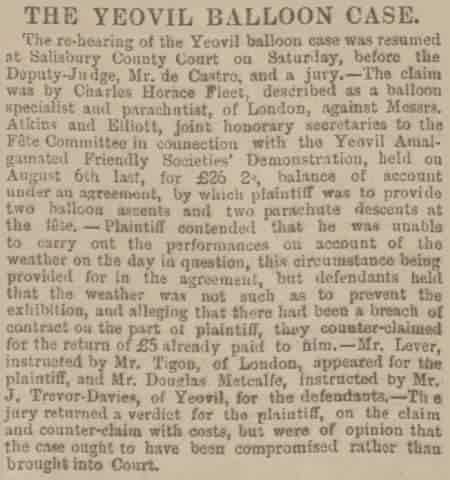
A report of the re-hearing of the 'Yeovil Balloon Case' from the 25 April 1902 edition of the Western Gazette.
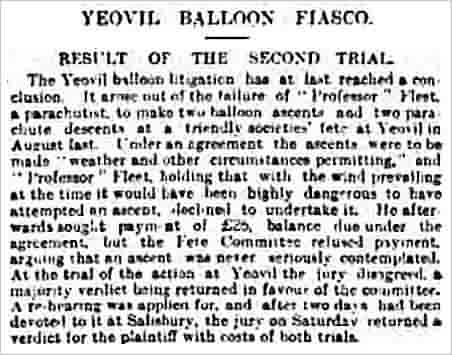
Three days earlier than the Western Gazette's report above, this report from the 22 April 1902 edition of the Western Morning News confirmed that the verdict was in favour of the plaintiff, 'Professor' Charles Fleet.